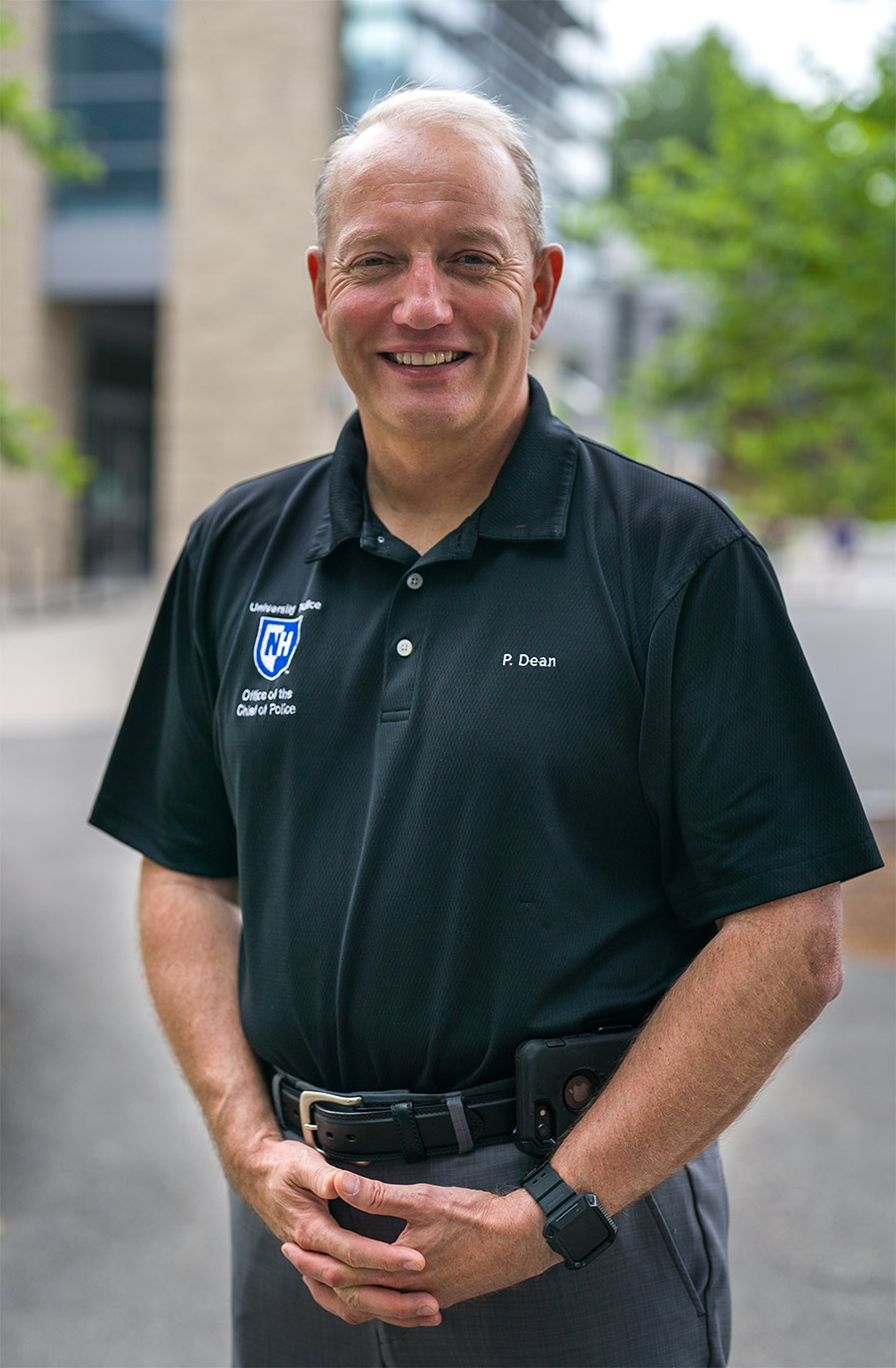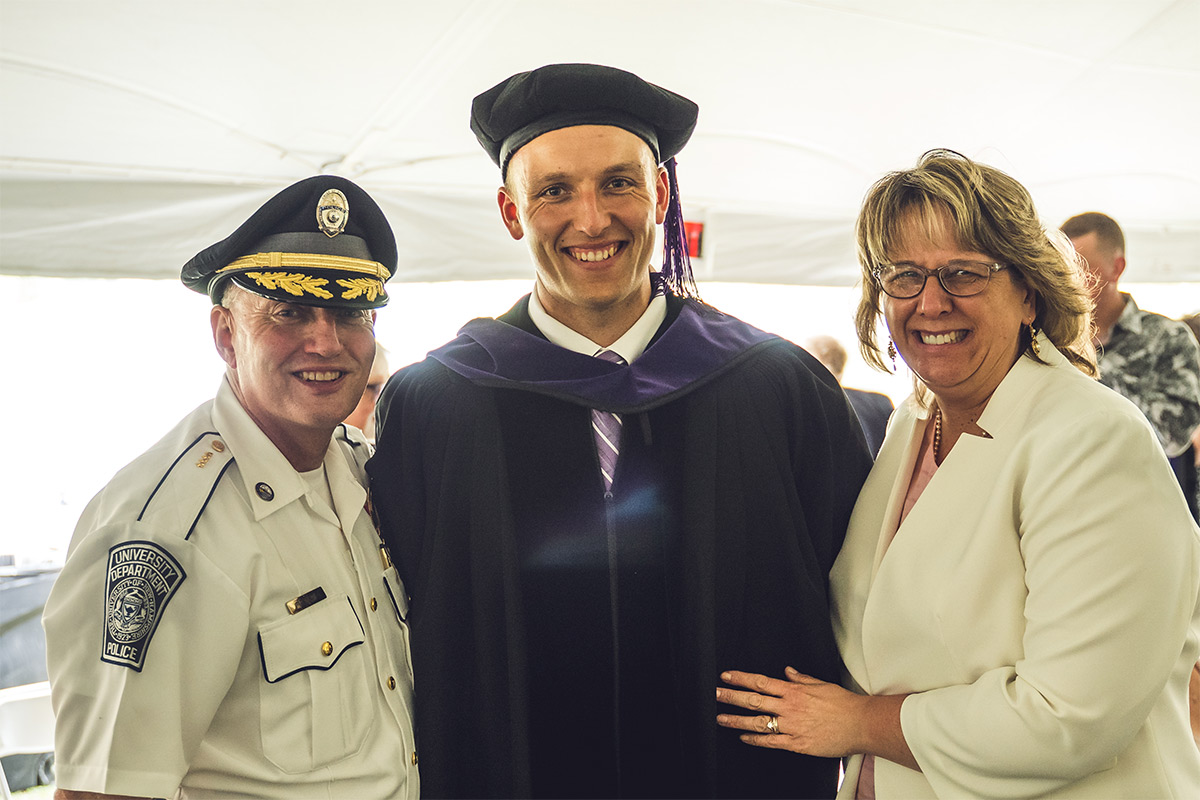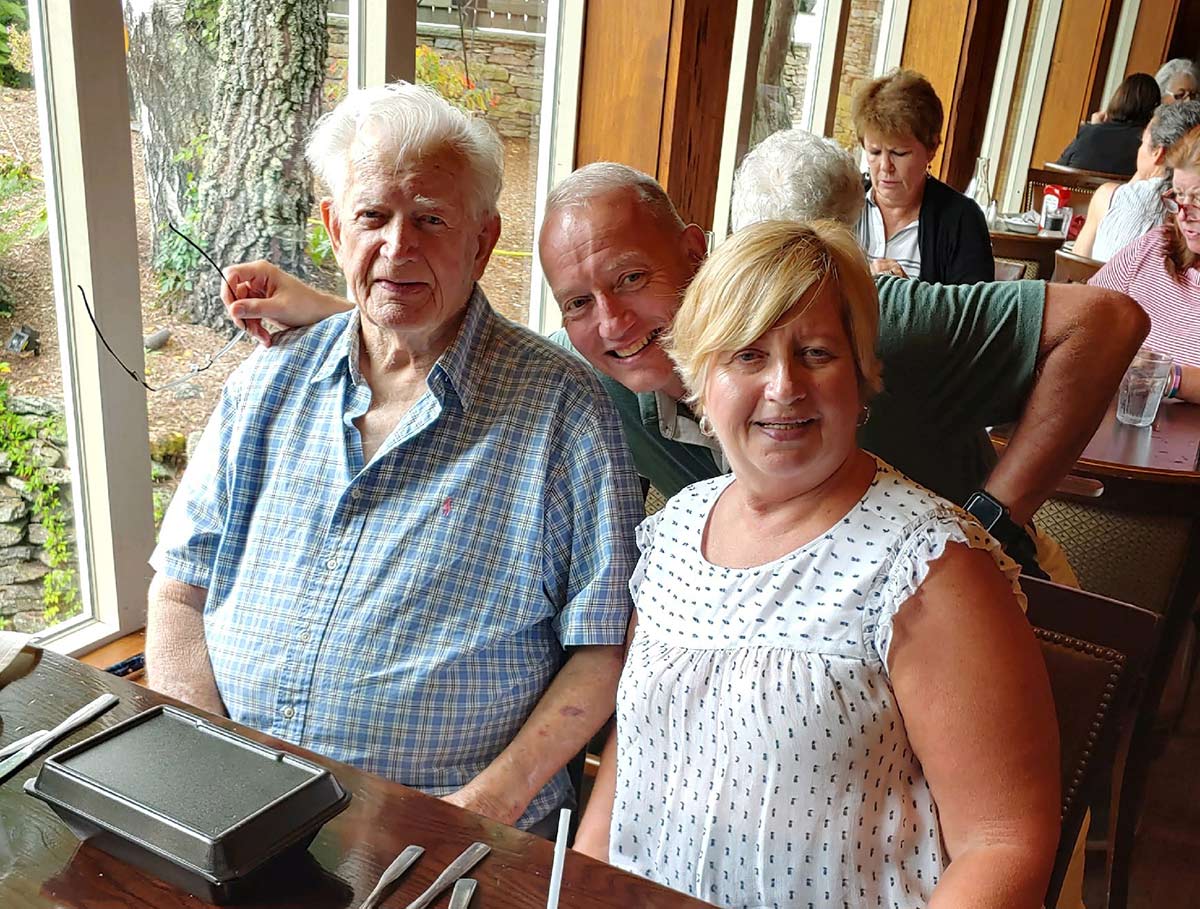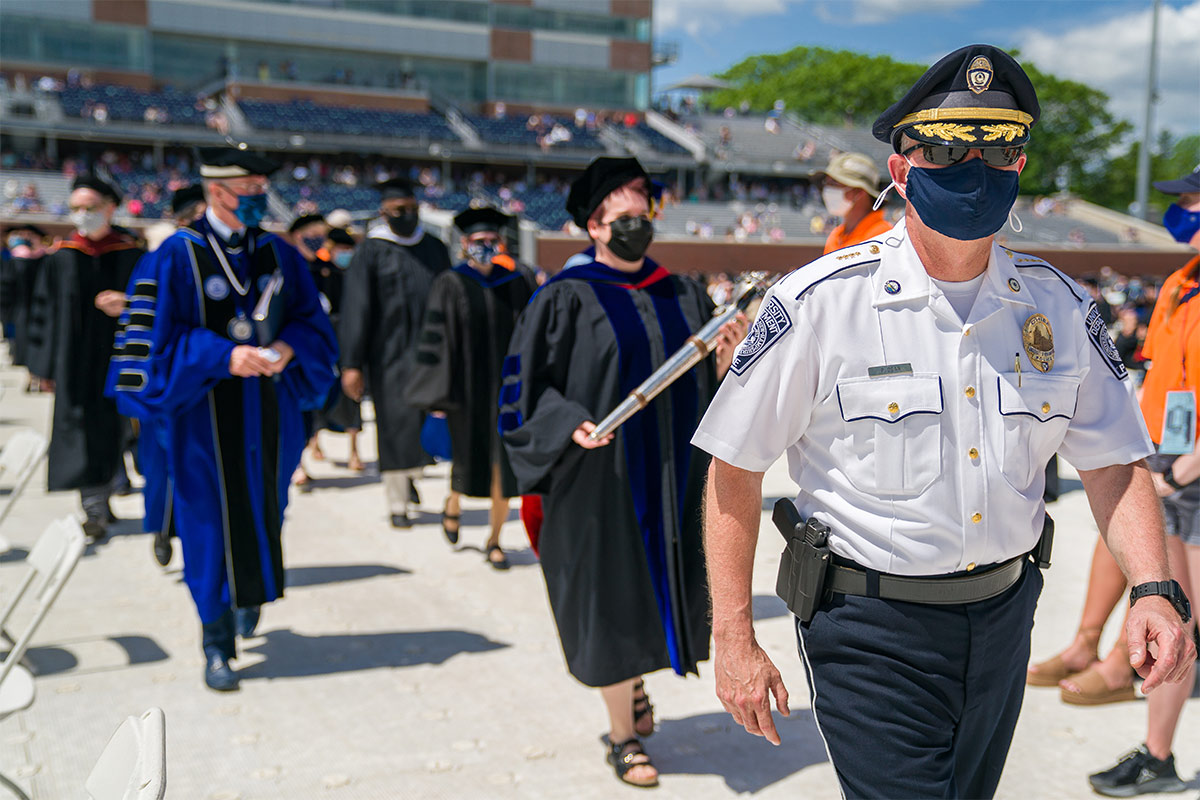s UNH Police Chief Paul Dean remembers it, spring semester 2020 had gotten off to a pretty typical start, with the serious work of policing a campus of some 13,000 students punctuated by lighter moments: posting on the department’s social media account about its “Coffee with a Cop” community outreach program or alerting followers to a power outage in a dorm. The campus was busy, the buildings full of faculty, staff and students — many of whom were looking ahead to spring break and finalizing their travel plans.
But at 9:58 a.m. on Thursday, March 12, 2020, with news reports increasing about a deadly virus spreading around the globe, Dean was called to a meeting with other campus leaders to discuss how to prepare for the arrival of COVID-19 at UNH.
“That was the moment it became very real,” says Dean. While leadership had been monitoring the virus from the start, suddenly, there were decisions that needed to be made. Would students be recalled from spring break early or asked not to go at all? Would campus need to be shut down, or could classes continue in some way? There were other, broader questions, too; questions that were harder to answer: How would UNH stay safe? How long would this pandemic last?
It was one of the many leadership meetings that would take place over the subsequent 16 months and counting, as COVID-19 took hold of life not just on college campuses but everywhere. During that time, Dean, who is the director of emergency management in addition to police chief for UNH’s three campuses in Durham, Manchester and Concord, has had a tumultuous ride, balancing everything from ever-changing state and federal health and safety guidance to the logistics of remote and hybrid working to the fear — happily unrealized — of a major outbreak.
In many ways, Dean was as prepared as anyone in his position could have been: he’s served for 36 years in law enforcement, undergone extensive emergency management training and is good at a leading in a crisis.
But nothing could have prepared him for the moment the pandemic turned personal: his father, Douglas Dean, 90, died from COVID-19 complications May 29, 2020, just days after being diagnosed with the illness.
“Most people don’t know when they look at first-responders what’s going on in their personal lives,” says Dean. “You have to put things in a box, and I have many boxes on many shelves. When my father died, I had to put my personal grief in a box, too.”
He says in the 10 years of his tenure as chief, some aspects of the work have remained the same, while others have changed drastically. One constant has been the focus on safety — from emergency/disaster preparedness to day-to-day security measures on campus. And of course, the impact of alcohol and drugs on the university community, and the “town-and-gown” connection between student life and Durham town residents.
What has increased in the past several years is the number of calls the department has received related to mental health — something Dean says is true for police departments nationwide. “We wear many hats, and police and fire are the people who some of these public health or societal issues fall to,” he says. “No matter when you call 911, we’re the ones who are coming.”
That shift hasn’t meant a decline in traditional enforcement duties, but it has meant an increase in “matters of the heart, people in crisis” either mentally or emotionally, Dean says. And with the onset of the pandemic, his “typical day” changed even more. Beginning in mid-March 2020, the Senior COVID Management Team of the President’s Leadership Council had daily meetings and remained in constant touch, incorporating updates from the national Centers for Disease Control and New Hampshire’s Health and Human Services Department into the university’s response plan, and getting the word out to the UNH community. As associate vice president for public safety and risk management, Dean also co-chaired the university system’s response to the COVID-19 pandemic with Keene State University President Melinda Treadwell. Beyond his own training, he credits the collective preparedness of the university leadership for saving the USNH schools from some of the scrambling he heard about from colleagues outside the state.
That preparedness helped action plans get put into place, and also meant UNH was a resource for other state agencies and businesses.
“When the CEO of ConvenientMD was looking for supplies, he came to us,” Dean recalls. “At one point, we were the only ones who had the PPE, masks, gloves, based on the right choices we made years ago. I was so proud that UNH was helping people in New Hampshire, to me that’s really what UNH stands for.”
In her co-chair, McCord says, she found an inspirational leader in the crisis, and “a deeply caring person and someone incredibly dedicated to that job.

In turn, Dean says of McCord and his other colleagues on the leadership team and beyond, “we went through battle together.” Throughout the pandemic, there was no end of the workday aside from sleeping. Dean’s days started at 4 a.m., and by 6 a.m. a steady stream of emails typically needed attention. Weekends and holidays ceased to exist.
And while Dean jokingly notes, “this is my first pandemic,” he has the credentials to lead in exactly the kind of crisis the past 16 months have presented. Beyond his training and years of service, he has high-level FBI and Department of Homeland Security clearance and is an advisory board member at the FBI National Academy in Quantico, Virginia, and The United States Department of Homeland Security State, Local, Tribal, and Territorial Government Coordinating Council. He also serves on the International Association of Campus Law Enforcement Administrators as an instructor in terrorism and emergency management issues. And in his role as campus police chief, he trains annually for potential emergency situations including terrorist attacks, mass casualty incidents, active shooter scenarios and even SARS or bird flu outbreak.
But leading in a crisis, even as a member of a team of leaders, requires more than tactical ability. To that end, Dean holds a Master of Science in leadership, and is a teacher — an adjunct instructor for UNH’s Homeland Security program. And while his LinkedIn page shows a follow for U.S. Department of Homeland Security, it also shows an equal interest in author and podcaster Brene Brown, who speaks on topics like vulnerability, shame and courage to sold-out audiences.

“I’m a public servant, my most important job is the person right in front of me. That’s how I was raised; I work for my team, I work for the entire campus, I work for you,” he says. Dean’s wife is a UNH alumna, youngest son Tom ’23 is a junior, and eldest Jonathan ’17 just earned his JD from UNH Law. It’s in part because of these family connections that he adds, “Listen, I love this place and what it does for people, and I love the mission. So if somebody has to call me at 2 in the morning, whether or not it’s related to public safety, at least I’m a person they can talk to. Most of the time I just listen a lot, and other times I’m helping them finding the answers or trying to sort out a problem,” he says. “It’s what needs to be done.”
“The very last conversation I had with my dad was on a video call on an iPad,” Dean recalls. “It was actually a great conversation; he was fine and seemed healthy at that moment. We were planning to go golfing in July.”
The next day, however, the elder Dean couldn’t open his eyes, and at the beginning of the following week, Dean’s sister Cathy called to say she didn’t think their dad was going to make it.
“I just remember saying, ‘What do you mean not going to make it?’” says Dean, recalling how quickly the virus overtook his father, a retired Marine and Korean War veteran who had made his career at a chemical company. The reality of the illness hit home when Dean got permission to see his father, who had been living in an assisted living facility in Rhode Island.
That day, he sat with his father for a long time, holding his hand and talking to him. He drove back to New Hampshire that night and then back to Rhode Island the following morning, a Friday. Realizing their father would pass soon, the Catholic family agreed they wanted a priest to deliver last rites, but because of COVID, none of the priests they knew would perform the ritual. Instead, Dean reached out to someone he knew who could help the family: former university chaplain Larry Brickner-Wood.
“I called him up at 8 o’clock at night on a Friday night, and he just said, ‘What do you need? I got you,’” says Dean, growing emotional as he recounts what would be his final few hours with his father. “He told me to hold the phone up to my father’s ear, and he gave the most beautiful sermon I’d ever heard.”
The facility staff ended visiting hours around 11 p.m. and Dean told his dad he’d be back in the morning.
Douglas Dean passed away that night.

At work, one of the people he shared the news with was McCord, who lost a close uncle to COVID.
“Here we were two people who had lost someone, we shared this unfathomable experience of how COVID ripped people away,” she says. “We shared the perspective of how bad it can be.” And if it made them take the most conservative route when it came to discussions of safety, they both feel a sense of peace about it knowing that collectively, the decisions that were made ultimately meant the loss they felt might be avoided by other families.
“People were dying every day, and we were trying to plan out campus events. I feel like there’s just going to be a road of pain for this country, not just for UNH, when the number of people lost really hits us,” says McCord. Of her shared experience with Dean, she says that losing a family member to COVID, “changes you … it changed him.”
Dean agrees. “It’s still pretty raw,” he says. “Whenever I see the number of cases and deaths across the bottom of a TV screen — those aren’t just numbers, that’s somebody’s family — and it became my family.”
Late last spring, on the heels of the George Floyd murder and growing national unrest, UNH president Jim Dean promised an action plan to address racial issues on campus. In September, he announced several diversity, equity and inclusion initiatives, including creating a more diverse student body, faculty and staff and “an inclusive and welcoming environment for all, especially people of color.” Part of that plan has been a police department response, which grew out of working with student leaders of the Black Student Union and other groups in addition to fellow administrators.
But he knows there is much more that needs to be done.
“The work we have to do around diversity, equity and inclusion is not a “one and done” type of work,” he says. Indeed, Dean says the process must include his own education, noting that he’s been reading and talking to more people to better understand perspectives and experiences outside his own. “We are trying our best to be a better police department for this community.”
What was going on? Dean wondered. Was it over? Would life soon return to a pre-pandemic normal?
Hardly, but at least for moment, it feels like what Winston Churchill famously described as “the end of the beginning”: a time to reflect on lessons learned and to look ahead. There is much to plan for the coming school year, with a fully open fall semester in the works.
“We’re still in this fight,” Dean says, “but we can manage COVID-19. I have always said my two sons went to UNH, and my youngest is living on campus, and I would never ask a parent to put their children in a situation I wasn’t willing to put my kids in.” Noting that he has to be able to look someone in the eye and say it is safe to be here and really mean it, he adds, “I have felt that way and will feel that way this fall.”
Another lesson? “When your pandemic plan is nothing like the pandemic you’re in, you need to think on your feet.” Dean credits the depth of experience of campus leadership, faculty, staff and students for making it possible to pivot quickly to protect the community as the crisis unfolded and information changed. Many times, he says, he wonders what his father might advise, and finds himself asking him in his head: Are we doing the right thing? The answer is always, eventually, yes. The smooth transition of the fall and spring semesters, the relatively low infection rates compared to worst-case-scenario predictions, the creation of the state-of-the-art testing lab and tracing program, and the ability to remain open and operational were sure signs of success for Dean and his fellow campus leaders.

“Seeing all the students there, and that need for closure — it was so powerful,” Dean says. “That moment said to me that all the decisions we made were the right ones.”